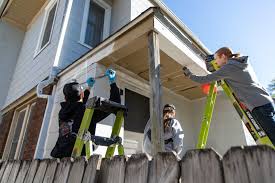Understanding Home Repair Grants
Home repair grants are funds provided by federal, state, or local governments, as well as nonprofit organizations, to assist homeowners in repairing or improving their homes. Unlike loans, these grants do not need to be repaid, making them an attractive option for those in financial need. The goal of these grants is to help maintain safe, livable conditions in homes, particularly for vulnerable populations such as low-income families, the elderly, and disabled individuals.
There are various types of home repair grants, each designed to address specific needs. Some grants focus on essential repairs, such as fixing a leaking roof, replacing outdated electrical systems, or addressing structural issues. Others may be targeted towards energy efficiency improvements, accessibility modifications for disabled residents, or even disaster recovery efforts.
Eligibility for Home Repair Grants
Eligibility for home repair grants varies depending on the specific program and the location. Generally, these grants are aimed at low-income homeowners who would otherwise struggle to afford necessary repairs. Factors that typically influence eligibility include:
-
Income Level: Many programs set income limits to ensure that assistance is directed toward those who need it most. These limits are often based on the median income for the area in which the applicant lives.
-
Home Ownership: Applicants must own the home that requires repairs. In some cases, the home must be the primary residence of the applicant.
-
Age and Disability: Some grants are specifically designed for elderly homeowners or individuals with disabilities. These programs aim to ensure that homes remain safe and accessible for residents with special needs.
-
Location: Certain grants are only available to residents of specific areas, particularly rural regions or areas affected by natural disasters.
-
Type of Repair: The nature of the repair or improvement may also influence eligibility. For example, some grants focus solely on energy efficiency upgrades or safety-related repairs.
How to Apply for Home Repair Grants
Applying for a home repair grant involves several steps, and the process can vary depending on the grant program. Here’s a general outline of how to apply:
-
Research Available Grants: Start by researching the grants available in your area. Local government websites, nonprofit organizations, and community centers are good places to find information about available programs.
-
Check Eligibility: Once you identify a grant program, review the eligibility requirements to ensure that you qualify. This step is crucial, as applying for grants you are not eligible for can waste time and resources.
-
Prepare Documentation: Gather the necessary documentation to support your application. This typically includes proof of income, ownership of the property, and details about the repairs needed.
-
Submit Application: Complete the application form provided by the grant program. Be thorough and accurate, as incomplete or incorrect applications can lead to delays or rejections.
-
Follow Up: After submitting your application, follow up with the granting agency to check the status of your application. Be prepared to provide additional information if requested.
The Benefits of Home Repair Grants
Home repair grants offer numerous benefits to homeowners and communities alike. Here are some of the key advantages:
-
Financial Relief: For many homeowners, covering the cost of repairs out of pocket is not feasible. Grants provide much-needed financial relief, allowing necessary repairs to be made without adding financial strain.
-
Improved Safety: Addressing critical repairs can significantly improve the safety of a home. Whether it’s fixing a hazardous electrical issue or reinforcing structural elements, these repairs help create a secure living environment.
-
Energy Efficiency: Some grants focus on energy-efficient upgrades, such as installing new windows or upgrading insulation. These improvements can reduce energy costs, benefiting both the homeowner and the environment.
-
Increased Property Value: Repairing and maintaining a home can increase its market value. This is particularly beneficial for homeowners who may want to sell their property in the future.
-
Community Well-Being: Well-maintained homes contribute to the overall well-being of a community. They enhance neighborhood aesthetics and can prevent the decline of property values in the area.

















